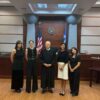In the presidential race, preliminary results from five precincts showed former Sen. Surangel Whipps Jr. leading over Vice President Raynold Oilouch by a small margin. Whipps received 1,169 votes against Oilouch’s 1,063.
The two are vying to succeed Tommy Remengesau, whose second term expires this year. The new president will take over the nation’s pending initiatives such as the renegotiation of the expiring terms of the Compact of Free Association as well as Palau’s offer to accommodate more military presence within its jurisdiction.
In the vice presidential race, J. Uduch Sengebau Senior was ahead of Frank Kyota.
Palauans also cast their votes for senators and members of the House of Delegates. Palau has no political parties, and all candidates are running as independents.
Whipps and Oilouch advanced to the general election after the September primary that eliminated Alan Seid and Johnson Toribiong.
In the primary, Whipps had a wide lead over Oilouch which according to local political observers gave a sneak preview of the final outcome of the presidential race.
Whipps, a local businessman and Remengesau’s brother-in-law, ran on a platform that backs tax reforms and expanded investments in education.
Oilouch, who branded himself as a “grassroots candidate,” campaigned for the preservation of Palau’s way of life and identity.
Palau quickly shut down its borders at the onset of the Covid-19 pandemic. While it is among the very few countries that have kept clear of the pandemic, the Pacific nation is not spared from the impact of the pandemic.
The Asian Development Bank has projected Palau’s economy to contract by 9.5% 2020 and 12.8% in 2021. A separate forecast released in June by the Graduate School USA’s Economic Monitoring and Analysis Program projected Palau to experience a 22.3% decline in GDP and a loss of 3,128 jobs, primarily in the private sector.
Tourism, the backbone of Palau’s economy, comprises about 80% of the nation’s total GDP and employs over 75% of the workforce. The closure of Palau’s borders due to the Covid-19 pandemic has paralyzed its visitor industry.










